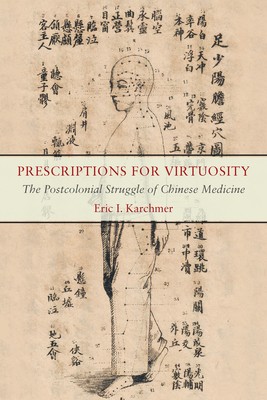
- We will send in 10–14 business days.
- Author: Eric I Karchmer
- Publisher: Fordham University Press
- ISBN-10: 082329983X
- ISBN-13: 9780823299836
- Format: 15 x 22.6 x 1.8 cm, softcover
- Language: English
- SAVE -10% with code: EXTRA
Reviews
Description
Although Chinese medicine is assumed to be a timeless healing tradition, the encounter with modern biomedicine threatened its very existence and led to many radical changes. Prescriptions for Virtuosity tells the story of how doctors of Chinese medicine have responded to the global dominance of biomedicine and developed new forms of virtuosity to keep their clinical practice relevant in contemporary Chinese society.
Based on extensive ethnographic and historical research, the book documents the strategies of Chinese medicine doctors to navigate postcolonial power inequalities. Doctors have followed two seemingly contradictory courses of action. First, they have emphasized the unique "Chinese" characteristics of their practice, defining them against the perceived strengths of biomedicine, and producing an ontological divide between the two medical systems. These oppositions have inadvertently marginalized Chinese medicine, making it seem appropriate for clinical use only when biomedical solutions are lacking. Second, doctors have found points of convergence to facilitate the blending of the two medical practices, producing innovative solutions to difficult clinical problems. Prescriptions for Virtuosity examines how the postcolonial condition can generate not only domination but hybridity. Karchmer shows, for example, how the clinical methodology of "pattern discrimination and treatment determination" bianzheng lunzhi, which is today celebrated as the quintessential characteristic of Chinese medicine, is a twentieth-century invention. When subjected to the institutional standardizations of hospital practice, bianzheng lunzhi can lead to an impoverished form of medicine. But in the hands of a virtuoso physicians, it becomes a dynamic tool for moving between biomedicine and Chinese medicine to create innovative new therapies.EXTRA 10 % discount with code: EXTRA
The promotion ends in 18d.18:32:06
The discount code is valid when purchasing from 10 €. Discounts do not stack.
- Author: Eric I Karchmer
- Publisher: Fordham University Press
- ISBN-10: 082329983X
- ISBN-13: 9780823299836
- Format: 15 x 22.6 x 1.8 cm, softcover
- Language: English English
Although Chinese medicine is assumed to be a timeless healing tradition, the encounter with modern biomedicine threatened its very existence and led to many radical changes. Prescriptions for Virtuosity tells the story of how doctors of Chinese medicine have responded to the global dominance of biomedicine and developed new forms of virtuosity to keep their clinical practice relevant in contemporary Chinese society.
Based on extensive ethnographic and historical research, the book documents the strategies of Chinese medicine doctors to navigate postcolonial power inequalities. Doctors have followed two seemingly contradictory courses of action. First, they have emphasized the unique "Chinese" characteristics of their practice, defining them against the perceived strengths of biomedicine, and producing an ontological divide between the two medical systems. These oppositions have inadvertently marginalized Chinese medicine, making it seem appropriate for clinical use only when biomedical solutions are lacking. Second, doctors have found points of convergence to facilitate the blending of the two medical practices, producing innovative solutions to difficult clinical problems. Prescriptions for Virtuosity examines how the postcolonial condition can generate not only domination but hybridity. Karchmer shows, for example, how the clinical methodology of "pattern discrimination and treatment determination" bianzheng lunzhi, which is today celebrated as the quintessential characteristic of Chinese medicine, is a twentieth-century invention. When subjected to the institutional standardizations of hospital practice, bianzheng lunzhi can lead to an impoverished form of medicine. But in the hands of a virtuoso physicians, it becomes a dynamic tool for moving between biomedicine and Chinese medicine to create innovative new therapies.

Reviews